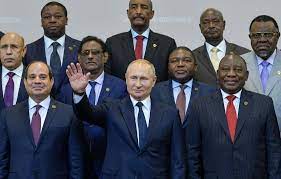The international community still awaits Africa’s unequivocal reaction more than 24 hours after Russian ground and air forces poured into neighbouring Ukraine in an invasion that has taken the world by surprise.
Several decades since the end of the cold war, Russian clout in Africa is enjoying something of a resurgence epitomised by the holding in 2019 of the first Russia-Africa summit in Sochi which 43 African leaders attended.
At the time of the summit Russian president Vladimir Putin had cast his net wide open for trade and aid to saying his country was more suited to helping Africa than Western nations which judge the continent’s governments and apply blackmail and intimidation to get their bidding.
Putin said Russia on the other hand respects state sovereignty and non-interference as a pinnacle of its diplomacy and will offer aid and trade without recourse to such political blackmail, hence the renewed interest from Africa.
Russia’s military presence around the continent is of growing significance especially in a strife-torn country like Mali where Russian mercenaries are fighting a jihadist insurgency and are thought to be making a significant headway where their counterparts from the west have failed, according to some security analysts.
According to Afreximbank, Africa’s trade with Russia exceeds $20 billion in 2021.
Although the groundswell of Africa leaders may as a matter of existential principle reject military aggression as a means to a cause, observers say, they are unlikely to raise a strident voice against Putin’s invasion of Russia’s neighbour.
Perhaps with the next Russia-Africa summit in October 2022 not too far in the horizon and with the prospects for rich deals being dangled by Moscow, African governments will not want to ruffle Putin’s feathers by stating their opposition to his invasion of Ukraine, a country where incidentally thousands of African students study in universities and are stranded as war broke out.
African governments wanting more of this trade with a resurgent Russia will naturally tread carefully even if they may hold no sympathies for Putin’s cause in Ukraine.
Thus aside from South Africa which has tossed ambiguities to one side and condemned what it calls Putin’s naked aggression on Ukraine, other countries across the continent have left it to the African Union to do the talking for them about the turn of events in eastern Europe.
In a rather limp statement the AU expressed concern over the Russian invasion and called for Putin to respect the territorial sovereignty of Ukraine and cease fire, a call that so far has fallen on deaf ears as Putin’s war machine march on the outskirts of the Ukrainian capital Kyiv.
Senegalese president Macky Sall who is the current chair of the AU issued a statement imploring Moscow to respect international law and territorial integrity of Ukraine.
Meanwhile the silence from African governments is so deafening that the Ukrainian honorary consul in Conakry Guinea, Charles Amara Sossoadouno urged the military junta led by Colonel Mamady Doumbouya to reveal its position on the Russian invasion.
The words of Sossoadouna, a Guinean, did not go down well with the junta and they have announced suspending his role as honorary consult until further notice.
Following the invasion, the junta held a crisis meeting over the fate of some 800 Guinean students stranded in Ukraine with a view to supporting them.
But about the actual conflict raging in Ukraine, nothing was said a source close to the junta in Conakry claimed.
The reaction elsewhere in Africa to Russia’s show of force in Ukraine may not be all that different from the one in Conakry.
MG/as/APA


